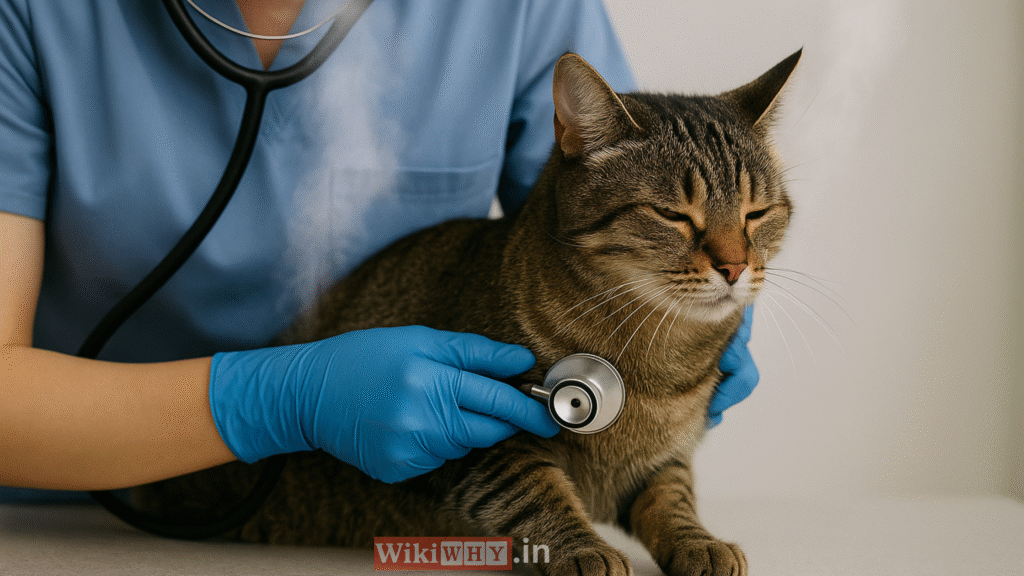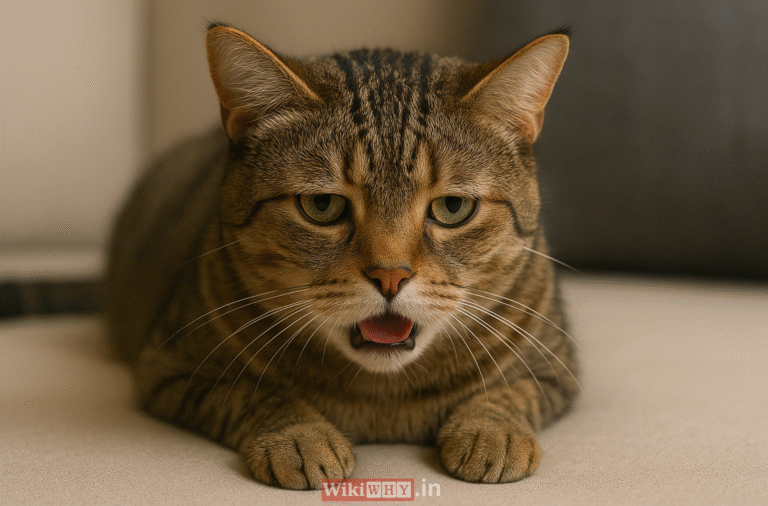In animals, just like in humans, some physical changes, be it in the pattern of breathing, body temperature, digestion, posture, or behavior may silently indicate their health.
We already discussed how Cat’s Poop Color Reveals information about their health . In the same manner, rapid or heavy breathing in a cat may be something that should concern you if you care for your cat or pet.
When you notice your cat just sitting in a resting position, yet her chest is going up and down very rapidly. She is not running around. She is not active but sitting and panting.
You might be wondering to yourself, “Is this alright? Should I phone the veterinarian(Vet)?” If you have ever wondered that, then this guide is for you.
We will discuss how cats typically breathe, what heavy breathing appears as, what issues can lead to it, and when to take your cat to the vet.
How does cats breath in normal condition?
A healthy resting cat maintains between twenty and thirty breaths during each minute of inactivity.
Its respiratory rate needs to be silent, easy, and smooth. You won’t see much chest movement, and the mouth should always remain closed.
✅ Identify Normal Breathing:
- Breaths are quiet and even
- Chest rises and falls gently
- No belly movement or effort
- Mouth stays closed
- No wheezing, coughing, or clicking sounds
You check your cat’s breathing rate at home in the same way a doctor checks yours. Just count how many times her chest moves in 15 seconds and multiply that by four to find her breath in a minute.
What Does Abnormal Breathing in Cats Mean?
If your cat’s breathing seems too fast, too noisy, it might fall into one of these categories:
Common Types of Abnormal Breathing:
1. Tachypnea:
This is rapid breathing—over 30 breaths per minute while at rest.
2. Dyspnea:
In this condition your cat feels difficulty in breathing. Hence your cat may breathe with an open mouth and stretch her neck to in-hale more air.
3. Panting:
Panting means being out of breath. Generally, dogs pant. But cats almost never pant. Hence if you observe your cat panting, it is the indication you should not ignore it and consult a vet.
Why Is My Cat Breathing Heavily? Common Causes Explained
Let’s look at some common reasons why your cat might be breathing heavily. Some causes are easy to fix at home, but others mean you should see a vet right away.
1. Stress or Overheating
Just like a normal human being, cats pant in anxious, excited situations. In these cases, letting your cat rest in a quiet, cool place usually helps.
Triggers Include:
- Intense play or exercise
- A stressful car ride
- Being in a hot room
If your cat finds comfort in a cool quiet area for 10 to 15 minutes it means she is doing well.
2. Upper Respiratory Infections (URIs)
These types of inspections are very normal in kittens and shelter cats & can damage its breathing.
Symptoms:
- Sneezing
- Runny or stuffy nose
- Coughing
- Fever
- Tiredness or loss of appetite
The infection arises through different viruses including feline herpesvirus and calicivirus. The right treatment combined with medications enables this condition to become treatable.
3. Feline Asthma
Like humans, cats also suffer from asthma because of inflammation in the cat’s lungs.
Asthma Symptoms:
- Recurring cough or gagging
- Wheezing or whistling while breathing
- Fast breathing or panting
- Open-mouth breathing
Exposure to smoke along with dust and pollen and household sprays can act as triggers for asthma. The medical approach for this condition involves simultaneous administration of inhalers and steroids combined with bronchodilators.
4. Heart Disease
Heart problems in cats can generate fluid that can cover the lungs and make it hard for her to breathe.
Warning Signs:
- Breathing rapidly at rest
- Lethargy or unwillingness to move
- Coughing
- Bloated belly
Diagnostic procedures in medical practice typically combine imaging methods with laboratory blood analysis to reach a final conclusion. Consequently, your feline companion will experience a major enhancement in life quality through your prompt medical intervention.
5. Pleural Effusion (Fluid Around the Lungs)
The space between lung tissues and protective membrane layers is accumulated by fluid which results in breathing problems.
Causes May Include:
- Heart disease
- Cancer
- Feline Infectious Peritonitis (FIP)
- Trauma or injury
Your vet will likely drain the fluid and investigate the root cause immediately.
6. Internal/External Injury or Trauma
Sometimes, small internal injuries due to fights or accident can lead to breathing problems.
Possible Internal Issues:
- Broken ribs
- Lung punctures
- Diaphragm ruptures
Consult a vet on a high priority basis as these conditions can lead to serious health problems in the long run.
7. Foreign Object Obstruction
Cats are curious creatures in nature. They may accidentally inhale something that gets stuck in the airway.
Signs of Obstruction:
- Gagging or choking
- Pawing at mouth
- Rapid or difficult breathing
- Panic or restlessness
In this scenario, you should always consult a vet.
8. Obesity
Excess weight is neither good for human health nor for animals like cats. It not only slow cats down but also create pressure on lungs and can cause breath problem.
What You Can Do:
- Feed a healthy cat food(low carb, balanced and protein)
- Encourage daily play
- Schedule regular weight checkups
Changes in your cat’s daily habits will lead to better respiratory function together with enhanced general wellness.
When Should You Consult Vet Immediately?

Some signs should never be ignored. Contact your vet right away, if your cat is:
- Panting for more than one minute
- Showing blue, pale, or gray gums
- Extremely lethargic or collapsed
- Breathing loudly or with a clicking sound
- Using her belly muscles to breathe
- Struggling to breathe while sleeping
👀 Monitor Your Cat’s Breathing at Home to Identify serious health problem
Want to keep a closer eye on things?
Here’s how:
- Observe the chest movement of your cat.
- Check breathing rate(number of times breath) per minute.
- Look for signs like wide-open nostrils or if your cat is breathing through her mouth.
- Creating a video recording becomes essential when you intend to show it to your vet.
These simple observations can offer your vet valuable insights.
What Will the Vet Do?
When you visit the clinic, the vet may perform:
- A physical exam(lungs and heart)
- Chest X-rays
- Blood tests
- Oxygen therapy
- Draining of fluid, if necessary
Many times identifying problems at an early stage helps you to react better.
How to prevent Breathing Problems in Cats
It not always possible to prevent many problems but at least you can some steps that can help to reduce risk
💡 Some Valuable Tips for Prevention:
- Avoid smoking indoors
- Don’t use strong air fresheners and sprays
- Use pet-safe cleaning products
- Vaccinate your cat regularly
- Do regular vet visits
- Maintain a healthy weight
- Use flea and parasite prevention
Case Study: Bella’s Scary Asthma Attack
Bella, a cute 3-year-old Persian, started panting unexpectedly after a typical play session. Her owner thought she was tired. But minutes ticked by, and panting didn’t let up.
Anxious, they took her to the vet. Diagnosis? Feline asthma induced by a new room spray.
With medication and a scented-free house, Bella recovered to her normal lively self. Her case is a reminder of just how sensitive your cat can be—and why quick action is important.
Final Reflections:
Your cat does not say much, but her body has a lot to say—and breathing is a large component of that. Heaving is anything from fleeting distress to fatal disease.
If something doesn’t observe normal, don’t wait. Watch, do, and always listen to your instincts. Dealing with breathing issues is truly a smart decision if you love your cat.















2 thoughts on “Why Is My Cat Breathing Heavy? Symptoms, Causes and Steps”